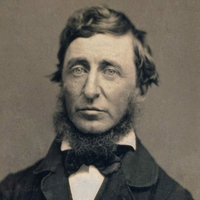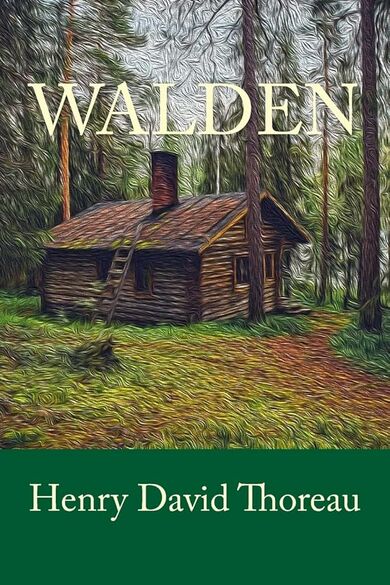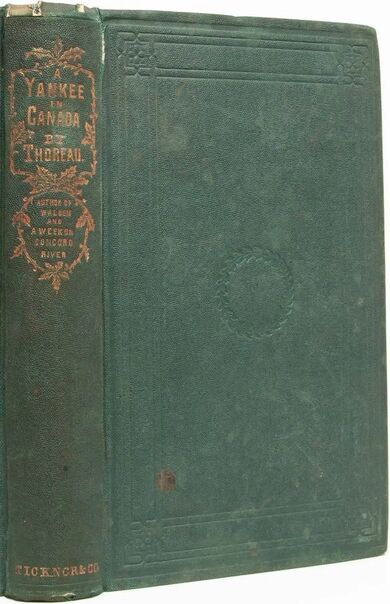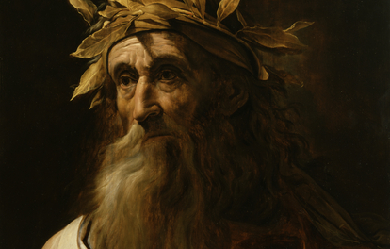
Chaucer
What a contrast between the stern and desolate poetry of Ossian, and that of Chaucer, and even of Shakespeare and Milton, much more of Dryden, and Pope, and Gray. Our summer of English poetry, like the Greek and Latin before it, seems well advanced toward its fall, and laden with the fruit and foliage of the season, with bright autumnal tints, but soon the winter will scatter its myriad clustering and shading leaves, and leave only a few desolate and fibrous boughs to sustain the snow and rime, and creak in the blasts of ages. We cannot escape the impression, that the Muse has stooped a little in her flight, when we come to the literature of civilized eras. Now first we hear of various ages and styles of poetry, but the poetry of runic monuments is for every age. The bard has lost the dignity and sacredness of his office. He has no more bardic rage, and only conceives the deed, which he formerly stood ready to perform. Hosts of warriors, earnest for battle, could not mistake nor dispense with the ancient bard. His lays were heard in the pauses of the fight. There was no danger of his being overlooked by his contemporaries. But now the hero and the bard are of different professions. When we come to the pleasant English verse, it seems as if the storms had all cleared away, and it would never thunder and lighten more. The poet has come within doors, and exchanged the forest and crag for the fireside, the hut of the Gael, and Stonehenge with its circles of stones, for the house of the Englishman. No hero stands at the door prepared to break forth into song or heroic action, but we have instead a homely Englishman, who cultivates the art of poetry. We see the pleasant fireside, and hear the crackling faggots in all the verse. The towering and misty imagination of the bard has descended into the plain, and become a lowlander, and keeps flocks and herds. Poetry is one man’s trade, and not all men’s religion, and is split into many styles. It is pastoral, and lyric, and narrative, and didactic.
Notwithstanding the broad humanity of Chaucer, and the many social and domestic comforts which we meet with in his verse, we have to narrow our vision somewhat to consider him, as if he occupied less space in the landscape, and did not stretch over hill and valley as Ossian does. Yet, seen from the side of posterity, as the father of English poetry, preceded by a long silence of confusion in history, unenlivened by any strain of pure melody, we easily come to reverence him. Passing over the earlier continental poets, since we are bound to the pleasant archipelago of English poetry, Chaucer’s is the first name after that misty weather in which Ossian lived, which can detain us long. Indeed, though he represents so different a culture and society, he may be regarded as in many respects the Homer of the English poets. Perhaps he is the youthfullest of them all. We return to him as to the purest well, the fountain furthest removed from the highway of desultory life. He is so natural and cheerful, compared with later poets, that we might almost regard him as a personification of spring. To the faithful reader his muse has even given an aspect to his times, and when he is fresh from perusing him, they seem related to the golden age. It is stil the poetry of youth and life, rather than of thought; and though the moral vein is obvious and constant, it has not yet banished the sun and daylight from his verse The loftiest strains of the muse are, for the most part, sublimely plaintive, and not a carol as free as nature’s. The content which the sun shines to celebrate from morning to evening is unsung. The muse solaces herself, and is not ravished but consoled. There is a catastrophe implied, and a tragic element in all our verse, and less of the lark and morning dews, than of the nightingale and evening shades. But in Homer and Chaucer there is more of the innocence and serenity of youth, than in the more modern and moral poets. The Iliad is not sabbath but morning reading, and men cling to this old song, because they have still moments of unbaptized and uncommitted life, which give them an appetite for more. He represents no creed nor opinion, and we read him with a rare sense of freedom and irresponsibility, as if we trod on native ground, and were autochthones of the soil.
Chaucer had eminently the habits of a literary man and a scholar. We do not enough allow for the prevalence of this class. There were never any times so stirring, that there were not to be found some sedentary stil. Through all those outwardly active ages, there were still monks in cloisters writing or copying folios. He was surrounded by the din of arms. The battles of Hallidon Hill and Neville’s Cross, and the still more memorable battles of Crecy and Poitiers, were fought in his youth, but these did not concern our poet much, Wycliffe much more. He seems to have regarded himself always as one privileged to sit and converse with books. He helped to establish the literary class. His character, as one of the fathers of the English language, would alone make his works important, even those which have little poetical merit. A great philosophical and moral poet gives permanence to the language he uses, by making the best sound convey the best sense. He was as simple as Wordsworth in preferring his homely but vigorous Saxon tongue, when it was neglected by the court, and had not yet attained to the dignity of a literature, and rendered a similar service to his country to that which Dante rendered to Italy. If Greek sufficeth for Greek, and Arabic for Arabian, and Hebrew for Jew, and Latin for Latin, then English shall suffice for him, for any of these will serve to teach truth “right as divers pathes leaden divers folke the right waye to Rome.” In the Testament of Love he writes, “Let then clerkes enditen in Latin, for they have the propertic of science, and the knowinge in that facultie, and lette Frenchmen in their Frenche also enditen their queinte termes, for it is kyndely to their mouthes, and let us showe our fantasies in soche wordes as we lerneden of our dames tonge.”He will know how to appreciate Chaucer best, who has come down to him the natural way, through the meagre pastures of Saxon and ante-Chaucerian poetry; and yet so human and wise he seems after such diet, that he is liable to misjudge him still. In the Saxon poetry extant, in the earliest English, and the contemporary Scottish poetry, there is less to remind the reader of the rudeness and vigor of youth, than of the feebleness of a declining age. It is for the most part translation or imitation merely, with only an occasional and slight tinge of poetry, and oftentimes the falsehood and exaggeration of fable, without its imagination to redeem it. It is astonishing to how few thoughts so many sincere efforts give utterance. But as they never sprang out of nature, so they will never root themselves in nature. There are few traces of original genius, and we look in vain to find antiquity restored, humanized, and made blithe again, by the discovery of some natural sympathy between it and the present. But when we come to Chaucer we are relieved of many a load. He is fresh and modern still, and no dust settles on his true passages. It lightens along the line, and we are reminded that flowers have bloomed, and birds sung, and hearts beaten, in England. Before the earnest gaze of the reader the rust and moss of time gradually drop off, and the original green life is revealed. He was a homely and domestic man, and did breathe quite as modern men do. Only one trait, one little incident of human biography needs to be truly recorded, that all the world may think the author fit to wear the laurel crown. In the earth we have described, and at this distance of time, the bare processes of living read like poetry, for all of human good or ill, heroic or vulgar, lies very near to them. All that is truly great and interesting to men, runs thus as level a course, and is as unaspiring, as the plough in the furrow.
There is no wisdom which can take place of humanity, and we find that in Chaucer. We can expand in his breadth and think we could be that man’s acquaintance. He was worthy to be a citizen of England, while Petrarch and Boccacio lived in Italy, and Tell and Termerlane in Switzerland and in Asia, and Bruce in Scotland, and Wickliffe, and Gower, and Edward the Third, and John of Gaunt, and the Black Prince, were his own countrymen; all stout and stirring names. The fame of Roger Bacon came down from the preceding century, and the name of Dante stil exerted the influence of a living presence. On the whole, Chaucer impresses us, as greater than his reputation, and not a little like Homer and Shakespeare, for he would have held up his head in their company. Among early English poets he is the landlord and host, and has the authority of such. The affectionate mention, which succeeding early poets make of him, coupling him with Homer and Virgil, is to be taken into the account in estimating his character and influence. King James and Dunbar of Scotland speak with more love and reverence of him, than any modern author of his predecessors of the last century. The same childlike relation is without parallel now. We read him without criticism for the most part, for he pleads not his own cause, but speaks for his readers, and has that greatness of trust and reliance which compels popularity. He confides in the reader, and speaks privily with him, keeping nothing back. And in return his reader has great confidence in him, that he tells no lies, and reads his story with indulgence, as if it were the circumlocution of a child, but discovers afterwards that he has spoken with more directness and economy of words than a sage. He is never heartless,
Er any word out from the mouth astart.”
And so new was all his theme in those days, that he had not to invent, but only to call.
We admire Chaucer for his sturdy English wit. The easy height he speaks from in his Prologue to the Canterbury Tales, as if he were equal to any of the company there assembled, is as good as any particular excellence in it. But though it is full of good sense and humanity, it is not transscendent poetry. For picturesque description of persons it is, perhaps, without a parallel in English poetry; yet it is essentially humorous, as the loftiest genius never is. Humor, however broad and genial, takes a narrower view than enthusiasm. The whole story of Chanticlere and Dame Partlett, in the Nonne’s Preeste’s tale, is genuine humanity. I know of nothing better in its kind, no more successful fabling of birds and beasts. If it is said of Shakespeare, that he is now Hamlet, and then Falstaff, it may be said of Chaucer that he sympathizes with brutes as well as men, and assumes their nature that he may speak from it. In this tale he puts on the very feathers and stature of the cock. To his own finer vein he added all the common wit and wisdom of his time, and everywhere in his works his remarkable knowledge of the world, and nice perception of character, his rare common sense and proverbial wisdom, are apparent. His genius does not soar like Milton’s, but is genial and familiar. It shows great tenderness and delicacy, but not the heroic sentiment. It is only a greater portion of humanity with all its weakness. It is not heroic, as Raleigh’s, nor pious, as Herbert’s, nor philosophical, as Shakespeare’s, but is the child of the English muse, that child which is the father of the man. It is for the most part only an exceeding naturalness, perfect sincerity, with the behavior of a child rather than of a man.
Gentleness and delicacy of character is everywhere apparent in his verse. The simplest and humblest words come readily to his lips. No one can read the Prioress’ tale, understanding the spirit in which it was written, and in which the child sings, O alma redemptoris mater, or the account of the departure of Constance with her child upon the sea, in the Man of Lawe’s tale, without feeling the native innocence and refinement of the author. Nor can we be mistaken respecting the essential purity of his character, disregarding the apology of the manners of the age. His sincere sorrow in his later days for the grossness of his earlier works, and that he “cannot recall and annull” much that he had written, “but, alas, they are now continued from man to man, and I cannot do what I desire,” is not to be forgotten. A simple pathos and feminine gentleness, which Wordsworth occasionally approaches, but does not equal, are peculiar to him. We are tempted to say, that his genius was feminine, not masculine. It was such a feminineness, however, as is rarest of find in woman, though not the appreciation of it. Perhaps it is not to be found at all in woman, but is only the feminine in man.
Such pure, childlike love of nature is not easily to be matched. Nor is it strange, that the poetry of so rude an age should contain such sweet and polished praise of nature, for her charms are not enhanced by civilization, as society’s are, but by her own original and permanent refinement she at last subdues and educates man.
Chaucer’s remarkably trustful and affectionate character appears in his familiar, yet innocent and reverent, manner of speaking of his God. He comes into his thought without any false reverence, and with no more parade than the zephyr to his ear. If nature is our mother, then God is our father. There is less love and simple practical trust in Shakespeare and Milton. How rarely in our English tongue do we find expressed any affection for God. There is no sentiment so rare as the love of God. Herbert almost alone expresses it, “Ah, my dear God!” Our poet uses similar words, and whenever he sees a beautiful person, or other object, prides himself on the “maistry” of his God. He reverently recommends Dido to be his bride,
Would have a love for beauty and goodnesse
And womanhede, trouth, and semeliness.”
He supplies the place to his imagination of the saints of the Catholic calendar, and has none of the attributes of a Scandinavian deity.
But, in justification of our praise, we must refer the hearer to his works themselves, to the Prologue to the Canterbury Tales, the account of Gentilesse, the Flower and the Leaf, the stories of Griselda, Virginia, Ariadne, and Blanche the Dutchesse, and much more of less distinguished merit. There are many poets of more taste and better manners, who knew how to leave out their dullness, but such negative genius cannot detain us long; we shall return to Chaucer still with love. Even the clown has taste, whose dictates, though he disregards them, are higher and purer than those which the artist obeys; and some natures, which are rude and ill-developed, have yet a higher standard of perfection, than others which are refined and well-balanced. Though the peasant’s cot is dark, it has the evening star for taper, while the nobleman’s saloon is meanly lighted. If we have to wander through many dull and prosaic passages in Chaucer, we have at least the satisfaction of knowing that it is not an artificial dullness, but too easily matched by many passages in life, and it is, perhaps more pleasing, after all, to meet with a fine thought in its natural setting. We confess we feel a disposition commonly to concentrate sweets, and accumulate pleasures, but the poet may be presumed always to speak as a traveller, who leads us through a varied scenery, from one eminence to another, and, from time to time, a single casual thought rises naturally and inevitably, with such majesty and escort only as the first stars at evening. And surely fate has enshrined it in these circumstances for some end. Nature strews her nuts and flowers broadcast, and never collects them into heaps. This was the soil it grew in, and this the hour it bloomed in; if sun, wind, and rain, came here to cherish and expand the flower, shall not we come here to pluck it?





